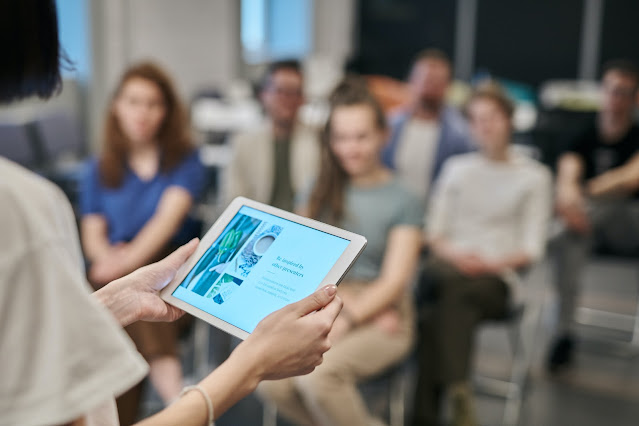 |
| Photo by fauxels from Pexels |
SEMINAR
– HOW to prepare for it & present It?
Synopsis
Higher studies usually do not have a single textbook
and the information is not fixed. New researches and updates keep happening in
each subject and they are added occasionally. Students obtain a variety of
information on a particular topic, either from referring to the textbooks or
from the lectures they attend. A seminar provides a platform for the students
to exchange their understanding and arrive at a consensus on the topic at hand.
Introduction
During academic learning, especially at a higher
education level, we are usually asked to present a paper.
Some of us may not know what it means, and some of us
think it is just reading notes we have taken down during a lecture.
A seminar is not either reading or lecturing. It is an
art in itself.
It involves a group of similar-minded individuals who
would like to know about a topic or discuss a topic of interest.
A single individual or a group of individuals might
present the paper to which the audience responds with their points of view.
The idea of a seminar is to collate the difference in
views and arrive at a suitable or agreeable conclusion.
P P O P I
To make it easy for students to remember so that they
can efficiently prepare for a seminar presentation, this has been divided into
five stages. Each stage is important and serves as a springboard for the
understanding of the topic.
For our convenience to remember the stages, they have
been classified as
“P P O P I”
¨ Planning
We shall understand each stage in detail.
1. PREPARATION
Choosing the Topic
a)
Topic should be Relevant
b)
Topic should elicit Interest
c)
The general aspects of the topic should be known to almost everyone
Brief Outline of the Paper
a)
Make a brief note of what you intend to communicate
b) Do
not take any sides
c) Be
specific
2. PLANNING
Reference Material
a)
Use reference ONLY to corroborate what you say
b) Do
not copy from a source material unless it is a quotation
c)
Quote as less as possible
d)
Indicate references to initiate further reading
Quality of the Article
a)
Try to be original
b)
Put forth what YOU have understood about the topic
c) Be
critical and try to see the other point of view,
also
d)
Never beat around the bush
e)
Make your point specifically and elaborate only when necessary
f) To
support your statement quote or mention references
g)
Ensure that the issues raised by you are linked with each other
h) DO
NOT generalize
I) DO
NOT make hasty judgments
j) DO
NOT arrive at prejudiced conclusions
Quantity of the Article
a)
Restrict your paper to 4 to 6 pages
b)
Your presentation should be over in 5 to 6 minutes
c)
Prepare charts wherever necessary
3. ORGANIZATION
Abilities Measured
a)
Subject Content
b)
Awareness
c)
Analytical Ability
d)
Capacity for Synthesis
e)
Ability to do research
f)
Scientific Temper
g)
Creative Thinking
Structure of the Article
a)
Introduce the topic
b)
Mention the need to know about the topic
c)
Write specifically what you need to convey
d)
Break them into as many sections or paragraphs as you can
e)
Mention the criticisms (both plus and minus points)
f)
Summarize
g)
Conclude with your recommendations and suggestions
4. PRESENTATION
a) Mention your topic loudly and clearly
b) Read slowly and clearly if you are reading the
paper
c) Stress on important words, phrases, and sentences
d) Repeat if necessary
e) Write (your notes or the paper) clearly and legibly
on one side of the paper so that mistakes are avoided during the presentation
f) Minimize writing on the Board
g) Say “Quote” and “Unquote”, when you are quoting
h) Eliminate unnecessary gestures, mannerisms, and
movements
i) Use Audio-visual Aids
j) In case you are presenting the paper with slides,
don’t cram each slide with too much information
k) Have bullet points and short sentences
l) Preferably, stick to headings and explain the
details
5. INTERACTION
a) The most important aspect of a seminar is a discussion
b) Encourage the participants to ask questions
c) Understand the question put to you clearly
d) Be specific and brief in answering
e) Suggest further reading if someone asks for too
much
f) If you are not clear of the answer, then say that
you do not know
g) Do not answer irrelevant questions
h) Obtain feedback from the participants
SUMMARY
1. Make PREPARATION while Choosing the topic and have a Brief Outline of the paper
2. Your PLANNING
should be focused on the Reference material, Quality, and Quantity of the
article
3. Your ORGANIZATION
of the paper should bring out your Abilities, and you must be able to Structure
your paper systematically
4. Your PRESENTATION
should be specific and to the point—clarity is the key
5. Encourage INTERACTION
so that the audience go back with meaningful information
All the best for your future
seminar presentations. Wish you a grand
success
What are 64 NAVA VIDYA or 64 New Skills?
A new approach to understanding the Eight Interaction Skills.
Ebook on The
Available in leading Internationaldigital stores -- $4.99/-
You can also purchase this ebook
directly from the author at over 50% discount rate of ₹200/-
by scanning the QR Code below and mentioning “Int 222” as a note.
Thank you for your patience.













You have worked nicely with your insights that makes our work easy. The information you have provided is really factual and significant for us. improve presentation skills course online Keep sharing these types of article, Thank you.
ReplyDeletePlease do not include any spam links in the comment box.